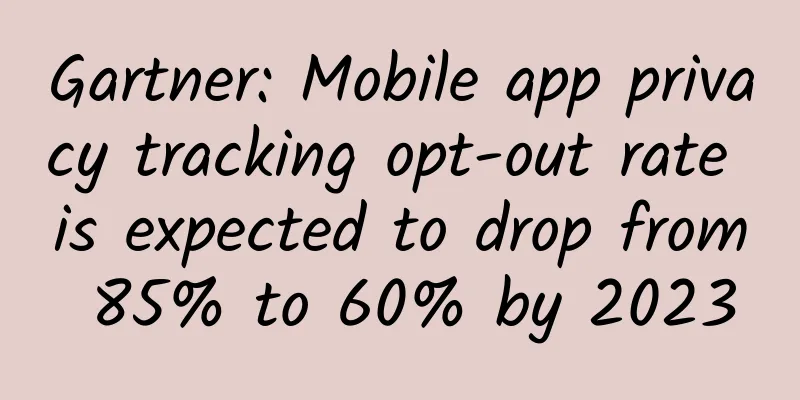Gartner: Mobile app privacy tracking opt-out rate is expected to drop from 85% to 60% by 2023

|
Research firm Gartner published a forecast on December 2, predicting the future of mobile applications tracking user data to provide personalized advertising. Under Apple's leadership, it is becoming increasingly difficult for apps to collect user preference data, as Apple requires apps to proactively prompt users whether they agree to collect personalized usage data. In 2021, about 85% of users chose to refuse to provide data, and this figure is expected to drop to 60% in 2023, meaning that more users agree to apps collecting certain preference data to provide personalized advertising or recommendations. Gartner said that in order to get users to choose "agree" as much as possible, some apps will even provide users with certain rewards, such as coupons, points, cash rewards, etc. However, Apple's terms do not allow such rewards. However, there are other ways for apps. Gartner recommends that marketers can express convincing reasons on the privacy collection prompt page to make users believe that collecting data will provide people with more relevant advertising and other information, and obtain a better user experience. It is understood that Gartner also predicts that by 2023, the number of advertisements provided during working hours on TV and streaming channels will increase by 60%. This is due to the trend of remote work, and people no longer need to wait until after get off work to be entertained. By 2023, 90% of new employee recruitment may be completed through B2B social media channels, so companies should focus on promoting their brands, employee benefits, etc. on the platform. By 2025, 20% of B2B companies will use artificial intelligence/machine learning tools to communicate with customers to improve communication efficiency. However, human sales representatives will still be indispensable. In addition, Gartner also predicts that by 2026, about 60% of those born after 1995 and 2000 will prefer shopping on social platforms rather than dedicated e-commerce platforms. |
Recommend
A brief analysis of Hololens' "holographic" application scenarios
From a technical point of view, Microsoft's H...
How to efficiently guide products to achieve self-propagation growth model
As a member of the growth department, when observ...
Making a high-quality chess and card game is not as easy as imagined
Since the emergence of entertainment halls such a...
If the screening shows a high risk for Down syndrome, will the baby be born with problems?
"The Down syndrome screening is high risk, t...
7 content models for corporate TikTok accounts
What is the most popular social short video platf...
Which data should startup apps monitor?
Many entrepreneurs have no experience in viewing ...
Apple releases new patent? Can it solve the crease problem of foldable devices?
According to foreign media reports, the U.S. Pate...
Sony HT-S500RF review: Turn your living room into a home theater in seconds with a 5.1-channel soundbar
If you want to turn your living room into a home ...
Dan Nystedt: Nvidia will contribute 11% of TSMC's revenue in 2023
According to financial expert Dan Nystedt's f...
Live streaming skills: 6 live streaming sales techniques!
If you want a good live streaming effect, live st...
How do experts design the conversion phase of training camps?
For operators, it is not difficult to promote an ...
The "final boss" of the movie "Jurassic World" turns out to be this!
The "guest" we are interviewing today i...
Everyone is discussing the functions of mini programs, but I want to talk about a few promotion methods
People are chasing hot topics at an increasingly ...
Product promotion from 0 to 1: How to acquire seed users?
Today we will introduce in detail how to write co...
Cocos Studio v2.0 Beta0 is officially released: multi-dimensional upgrades and comprehensive performance improvements
The explosive growth of the mobile game market is...









